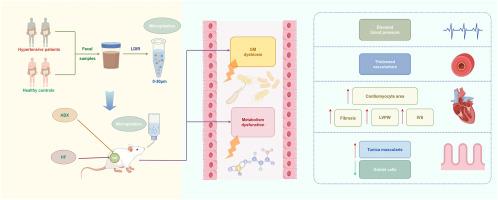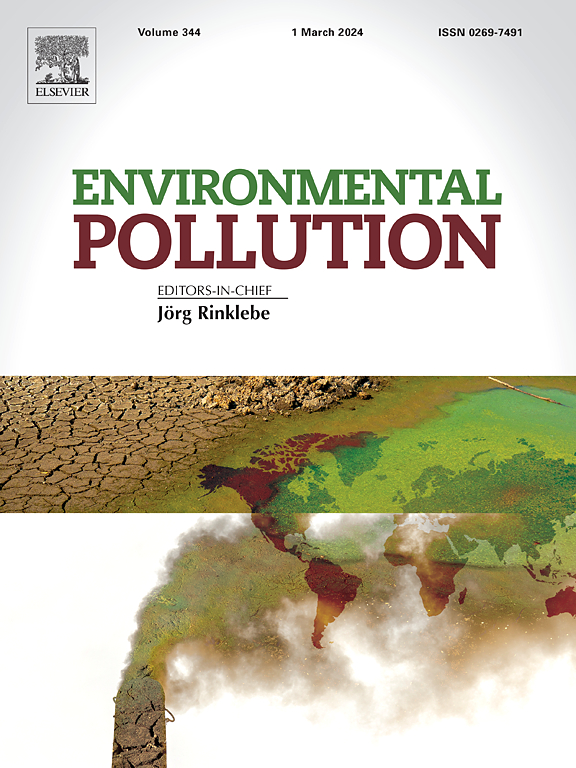The influence of microplastics on hypertension-associated cardiovascular injury via the modulation of gut microbiota
IF 7.3
2区 环境科学与生态学
Q1 ENVIRONMENTAL SCIENCES
引用次数: 0
Abstract
Microplastics (MPs) have been found to interfere with the gut microbiota and compromise the integrity of the gut barrier. Excessive exposure to MPs markedly elevates the risk of cardiovascular disease, yet their influence on hypertension remains elusive, calling for investigation into their potential impacts on blood pressure (BP) regulation. In the present study, an increase in the concentration of MPs was observed in the fecal samples of individuals suffering from hypertension, as compared to the controls. Oral administration of MPs led to obvious increases in systolic, diastolic and mean BP levels in mice. MPs were associated with promoting myocardial hypertrophy, fibrosis, and cardiac remodeling through alterations in gut microbial composition, such as Prevotella and Coprobacillus, or fecal metabolites Betaine and Glycyrrhetinic acid. The hypertensive damage mediated by MPs was significantly mitigated by the high-fiber diet or antibiotics that targeted the gut microbiota. Notablely, fecal microbiota transplantation from mice treated with MPs led to an increase in systolic BP levels and the development of cardiac dysfunction. Our findings offer valuable insights into the complex interplay between MPs and the gut microbiome in the context of hypertension, and suggest potential strategies for reducing the vascular and cardiac injury caused by MPs.


微塑料通过调节肠道微生物群对高血压相关心血管损伤的影响
微塑料(MPs)已被发现会干扰肠道微生物群,损害肠道屏障的完整性。过度暴露于MPs可显著提高心血管疾病的风险,但其对高血压的影响尚不明确,因此需要对其对血压调节的潜在影响进行研究。在本研究中,与对照组相比,高血压患者的粪便样本中MPs浓度增加。口服MPs可明显提高小鼠的收缩压、舒张压和平均血压水平。MPs通过改变肠道微生物组成(如普雷沃氏菌和副杆菌)或粪便代谢物甜菜碱和甘草次酸,与促进心肌肥大、纤维化和心脏重塑相关。高纤维饮食或针对肠道微生物群的抗生素显著减轻了MPs介导的高血压损伤。值得注意的是,用MPs处理的小鼠粪便微生物群移植导致收缩压水平升高和心功能障碍的发展。我们的研究结果为高血压背景下MPs与肠道微生物群之间复杂的相互作用提供了有价值的见解,并提出了减少MPs引起的血管和心脏损伤的潜在策略。
本文章由计算机程序翻译,如有差异,请以英文原文为准。
求助全文
约1分钟内获得全文
求助全文
来源期刊

Environmental Pollution
环境科学-环境科学
CiteScore
16.00
自引率
6.70%
发文量
2082
审稿时长
2.9 months
期刊介绍:
Environmental Pollution is an international peer-reviewed journal that publishes high-quality research papers and review articles covering all aspects of environmental pollution and its impacts on ecosystems and human health.
Subject areas include, but are not limited to:
• Sources and occurrences of pollutants that are clearly defined and measured in environmental compartments, food and food-related items, and human bodies;
• Interlinks between contaminant exposure and biological, ecological, and human health effects, including those of climate change;
• Contaminants of emerging concerns (including but not limited to antibiotic resistant microorganisms or genes, microplastics/nanoplastics, electronic wastes, light, and noise) and/or their biological, ecological, or human health effects;
• Laboratory and field studies on the remediation/mitigation of environmental pollution via new techniques and with clear links to biological, ecological, or human health effects;
• Modeling of pollution processes, patterns, or trends that is of clear environmental and/or human health interest;
• New techniques that measure and examine environmental occurrences, transport, behavior, and effects of pollutants within the environment or the laboratory, provided that they can be clearly used to address problems within regional or global environmental compartments.
 求助内容:
求助内容: 应助结果提醒方式:
应助结果提醒方式:


